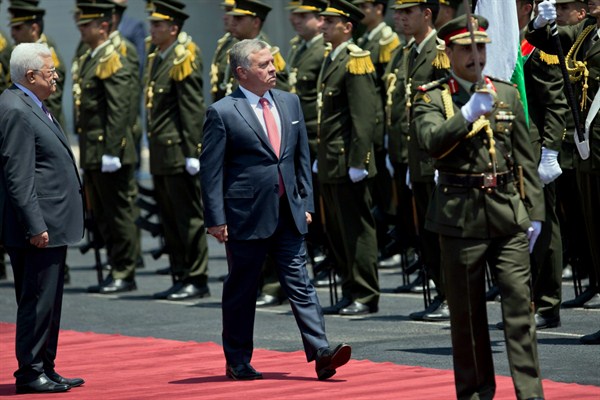Jordan’s King Abdullah II has been quietly busy. On July 7, after months of meticulous negotiations in Amman and elsewhere, the U.S., Russia and Jordan concluded a cease-fire agreement in southern Syria that, in addition to quelling the violence in its target area, brought an interim calm to Jordan’s northern border and helped stem the flow of refugees entering the country. Weeks later, as Jerusalem lurched toward the brink of a religious conflagration, Abdullah stepped in and used his position as the custodian of Muslim holy places in the city to negotiate with Israelis and Palestinians and restore calm. All this came on top of managing the fallout from a shooting at the Israeli Embassy in Amman—in which two Jordanians were killed by an Israeli security guard—that almost created yet another political crisis with Israel.
These two episodes would appear to be big wins for the small, often-ignored kingdom as it attempts to cope with problems on its borders. But Abdullah is walking a much longer tightrope above a dizzying array of regional challenges that continue to keep his country on edge. On top of it all, Jordan’s economy is near insolvency, and its leadership is being forced to make hard choices amid political infighting between allies and neighbors.
On June 5, when a Saudi-led coalition of Arab states shocked the world by initiating a full boycott against Qatar, ostensibly for supporting terrorists and having a favorable relationship with Iran, Jordan was left scrambling for an appropriate position. Two days later, in order to avoid any backlash from its largest benefactor, Saudi Arabia, Jordan scaled down its diplomatic relationship with Qatar, which happens to be an ally and is home to roughly 50,000 Jordanian expats. The move was emblematic of the balancing act Abdullah has had to perform in order to maintain essential relationships in the region, while keeping Jordan safe and stable. Yet the Qatar crisis adds to Jordan’s already severe economic woes, by eliminating another major trading partner from a group that once included Syria and Iraq, as well as Turkey, via a trade route that ran through Syria.

